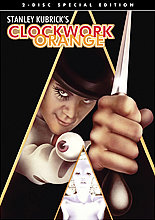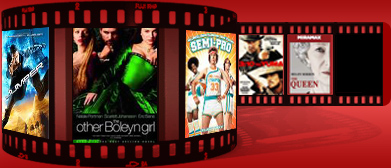Free Membership
Welcome to DVD-Movie-Sale.co.uk!
DVD Movie Sale is a comprehensive DVD site where you can search for any movie by genre, film title, actors name or director. Complete with full film information & synopsis as well as being able to compare prices for your favourite DVD from leading retail stores. You even have the opportunity to include your personal film reviews or give your personal ratings with numerous chances to win dvd related prizes.
Browse DVDs
Clockwork Orange, A (Special Edition)
Clockwork Orange, A (Special Edition)

Director: Stanley Kubrick
Summary: A gang of teenagers go on the rampage beating and raping helpless victims. After an altercation, one gang member is knocked unconscious and left for dead. When the police find him, they perform a controversial new 'aversion therapy' in an attempt to rid him of his violent impulses. Upon his release, the gang come after him...
From its opening shot of Malcolm McDowell staring with evil intent directly into the camera (which pulls back to reveal him drinking a glass of milk), Stanley Kubrick's brilliant CLOCKWORK ORANGE announces itself as a completely new kind of viewing experience. Banned in Britain for decades, the film, set in an unidentified future, overwhelms the senses with its almost comic depictions of rape and violence set to an upbeat classical and pop music score; its magnificent, colourful, futuristic set designs; and its utter determination to shock, frighten, and thoroughly entertain its audience. Kubrick based his chilling masterpiece on Anthony Burgess's culture-shaking novel about a young man, growing into adulthood, who has a bit of a problem with authority figures. (Interestingly, Burgess's stunning piece of fiction contains 21 chapters, but Kubrick ends his film after chapter 20). When Alex (a career-defining performance by McDowell) and his droogs go out for a little bit of the old ultraviolence, he is caught and forced to undergo controversial treatment that will make it impossible for him to commit violent acts--but has severe side effects. Kubrick's film purposely confuses crime and punishment, cause and effect, hero and villain, irony and satire, filled with oxymoron and paradox, taking on science, politics, societal mores, education, sexual awakening, and parental responsibility all in a new language (both verbal and visual) that would change the face of cinema forever. No one who has seen it has ever been able to hear ‘Singin' in the Rain’ or Ludwig van again in quite the same way.

WIN DVDS by being amongst the first to review this DVD. Reviewing DVDs earns you bonus entries and lets you WIN DVDs!Please login before reviewing this DVD. If you're a new user, register for free and enter to WIN FREE DVDs!























